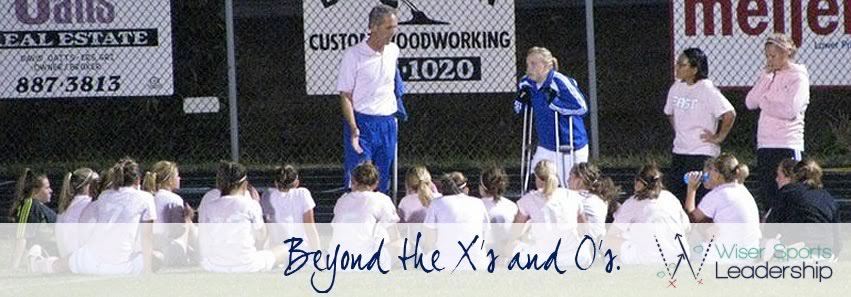February 18, 2018 ·
DeAngelo Wiser
·
Uncategorized
DeAngelo Wiser
Be yourself
Use all the God given attributes you have with your team.
Use the light that shone for you.
Apply the best characteristics/traits from your high school/college coach/parents/minister/teacher/mentor. How would they handle this situation? Don’t be reluctant to call them.
Be able to sleep at night.
Exhibit character and integrity in everything you do- Do what is right regardless of the player or situation.
Inspire through your example
Outwork your team in preparing for practice, games, trips and meetings. Show them how important preparation is at all times.
Trust those around you
Challenges and distractions will take a huge amount of your time. Delegate.
Be what you hope to see
Be positive, encouraging and enthusiastic. Remember you set the tone.
You get what you allow
Biggest complaint I hear from former players is “These players won’t do what I say, or they aren’t motivated.” Remember, you get what you expect.
Stay on your path
Don’t let one bad moment by one player define your practice or a game, remain focused on so many who count on you. There will be time to talk later.
Be willing to hire someone who could take your place.
Hire an assistant coach who isn’t like you, and not afraid to question your decisions. If you both always agree one of you isn’t necessary.
Step to the front if you lose, and to the back in a win.
Always give your team credit for success and always take the blame for losses or bad times.
Impacting players lives in a positive way should be your goal.
Coaching is about moments, not championships and trophies. Every day you’ll have the opportunity to connect with players in a positive way.
Listen with the intent to hear and understand.
Allow someone to vent, you don’t have to win every battle. Listening is one of the most important skills you’ll need in this profession.
Reflections
Everything you and your team do is a reflection of the school, your family and yourself. Remind yourself even in the toughest of times.
Be willing to step up and lead
Decisions will be a big key in how effective you’ll be with your team- players are watching and recording how you handle it. Be consistent in holding all players accountable.
Build decision makers
Whenever possible allow players to make decisions on the field or court. There will be many times when this is necessary. Take away their complete dependence on you. When they say I did it all myself, you’ve done your job.
I wish you the best in your career, and positively influencing other coaches
February 13, 2018 ·
DeAngelo Wiser
·
Uncategorized
DeAngelo Wiser
Managing the dynamics of your team is a key component in being successful. As we all know, a team in disarray will never reach its potential, while a team with positive dynamics will reach as high as their skills will carry them.
Have you ever had players or a group of players that deliberately disassociated themselves from the rest of the team? It’s pretty obvious when it happens. Characteristics such as arriving just in time for practice as a group or individually, or maybe fashionably late. Wearing something different than the rest of the team, or conveniently forgetting a warm-up shirt that everyone else is wearing to school or before the game.
It may only be a perception that team members have about other players with respect to their behavior, or it may be more. In either case, it can have a far reaching effect on the mental outlook of your team.
Granted, some are minor issues and have easy solutions, but as a coach, you have to deal with them. As much as you might wish, they usually won’t go away on their own. You’re being tested, and the rest of the team is paying attention. You set the tone!
I’ve always told the team, “You’re either in this as a team or you’re not in at all!” Allowed to continue, these minor rebellions can become major and disrupt the team dynamics needed to be successful.
Coaches can’t make one player like another, and I understand the need for some players to express their individuality. But it should not be at the expense of everyone else, and certainly not when our expectations are clear.
That brings me to the point of “How will you deal with it?”
Jealousy- A terrible affliction that can destroy a team
Everyone was looking forward to our season. We had a great group of veteran players coming back. They’d been loyal to the team and done everything we as staff had asked. You can’t replace veteran leadership and experience, and we would need it this year. The excitement from those familiar with our program, however, was due to our new group of younger players. They were highly skilled and athletic. And that was the rub– jealousy. It’s a terrible disease for a team to have. It can be treated, but rarely does it go away forever.
Every year, the younger players were getting better and better. Several of veteran player’s priorities were changing. They were concentrating less on soccer, and it showed in their skills. One of our best veteran players left practice one day in the preseason and never came back.
Soon we had two groups: some of the veteran players who felt threatened, and the younger athletes who were fairly clueless to the situation, and just wanted to play. Talking to the younger group would be fruitless. What would you say as a coach? “Could you please not play as well so the rest of the team will feel comfortable?” We needed them to play and compete for us to succeed, and we needed the veterans to do the same.
I finally talked with the veteran group. I reminded them that everyone on the team needed everyone else for us to have a great year. It was a message lost in the wind. Clearly the selfish, individual needs from that group would not be swayed. And, sadly, they already had controlled their own destiny by not working on their game in the off season over the last few years.
It was a terrible learning experience for me, and quite disappointing, actually, to see young people act that way toward others who had done nothing to them. But there will be times when there simply aren’t any easy solutions or happy endings. This one wouldn’t have one, and looking back, maybe that was what the older players wanted.
You just have to continue to work through situations like this throughout the season and make decisions based on what’s best for the team. In our case, several veteran players who had started the year before were replaced by younger, highly skilled players.
What can you do to promote positive dynamics on your team?
Expectations- Be very clear in what you expect and never settle for less.
Consistent- Take care of issues immediately and consistently regardless of which player or group of players it is.
Encourage- Let players know they can talk to you at any time
Leadership Council- Form a leadership council of your players for your players with issues and concerns.
Team Building- Take every opportunity to use team building activities. It’s a great way for players to get to know new members.
History- Tell stories about successful teams, either yours or others, and what made them successful.
Compete- Explain that competition is healthy and it will determine who plays.
Coaching- Let them know your philosophy on what it takes to succeed with respect to teamwork, and that you will always do what’s best for the team.
Representation- Players represent the team, their school and their family, and should act accordingly. They are no longer just an individual.
Communication- Encourage players to talk with each other before getting anyone else involved.
Explain/Explain/Explain- No matter how many times you think you’ve explained the expectations, conduct, playing time, etc., you’ll have to do it over and over. A coach once told me, “You show them a thousand times, and then you show them one more.”
Remove the problem– If all efforts have been fruitless, and there is simply no other option, take the initiative with the support of your Athletic Director to cut the player or players lose that are the source of the problem. Not playing them, while a temporary solution to send a message, will not get them away from influencing the rest of the team every day.
As coaches, we pride ourselves on the ability to recognize and solve challenges whether they’re on the field or on the sidelines. One of our biggest challenges will be convincing our players how much they can accomplish if they all work together. That’s never as easy as it sounds, and how we handle issues that attempt to derail our team objectives are among the most challenging. It’s not easy, but always remember- “Striving for great Leadership never ends!” Your players are counting on you.
I wish you and your team the best!

